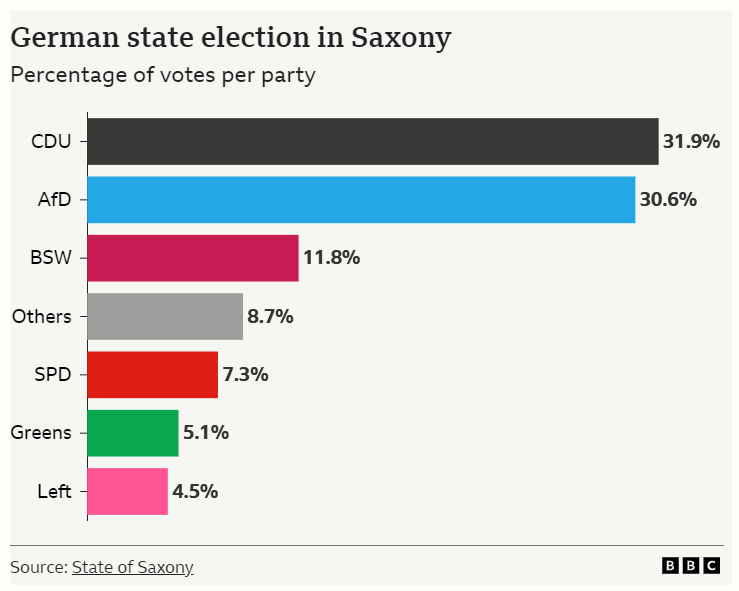The Alternative for Germany (AfD) has become the first far-right party to win a state election in Germany since World War II
German Chancellor Olaf Scholz described the election results of the two regional elections in eastern Germany, which showed the far-right Alternative for Germany (AfD) as the big winner. “bitterness” for his governing coalition, and urged the parties of the democratic arc to form local governments without “right-wing extremists”. The parties of the governing coalition suffered heavy losses (CDU, Greens, FPD).
The Alternative for Germany (AfD) became the first far-right party to win a state election in Germany since World War II with its result in the weekend election in Thuringia. She came a close second behind the conservatives in Saxony, according to forecasts late on Sunday.
But the AfD, considered “far-right” by security officials in both East German states (Thuringia-Saxony), is unlikely to be able to govern as the other parties have so far refused to work with it to form a majority.
However, the nationalist, anti-immigration and Russia-friendly party could end up with enough seats in both states so as to hinder decisions requiring a 2/3 majority, such as the appointment of judges or top security officials, giving him unprecedented power.
“The results for the AfD in Saxony and Thuringia are worrying,” Scholz told Reuters. He clarified that he was speaking as a lawmaker for his center-left Social Democrats (SPD).
“Our country cannot and he must not get used to such a thing. The AfD is hurting Germany. It weakens the economy, divides society and destroys the reputation of our country,” he pointed out.
With a year to go until Germany’s national elections, Sunday’s results punished Scholz’s — rather troubled — coalition, which could exacerbate infighting.
All three ruling parties lost votes, with only the SPD comfortably exceeding the 5% “threshold” required to remain in the two state parliaments.
The BSW of left-wing leader Zara Wagenknecht, a former member of the East German Communist Party, fared better than all three coalition partners in its first regional election, coming in third.
“The results of Sunday’s election are bittersweet – for us too,” said Soltz. However, he noted that the worst predictions, that the SPD could be left out of the local parliament for the first time, have not materialized.
The smaller coalition partners, the Greens and the Free Democrats, were both left out of Thuringia’s state assembly.
Sunday’s results could push the government to get even tougher on immigration and intensify the debate over continued support for Ukraine, issues that dominated the election campaign.
German far-right celebrates: “Historic election victory”
The far-right Alternative for Germany (AfD) spoke of “historical success”. In the eastern state of Thuringia, the AfD is set to win almost a third of the vote, according to a forecast by public broadcaster ARD, nine points ahead of the conservative CDU (Christian Democrats), and well ahead of Germany’s three governing parties – the Social Democrats, the Greens and the liberal FDP.
The AfD came a close second in the more populous neighboring state of Saxony. Forecasts there gave the CDU almost 32% of the vote, just one point ahead of the AfD, and again well ahead of the three parties in the federal government.
The AfD’s leading candidate in Thuringia, Bjorn Hecke, who is a highly controversial figure in Germany, hailed a “historic victory” and spoke of “great pride”.
Hecke’s party has been branded right-wing extremist and fined for using Nazi slogans, although the former history teacher denies knowingly doing so.
With federal elections just a year away, the AfD is second in national opinion polls. Party co-leader Alice Weidel said the result was a “requiem” for Germany’s three ruling parties. And it was clear that voters in both eastern states wanted her party in government. “Without us, a stable government is no longer possible at all,” he said.
That message was echoed by Hecke, who hinted that there are many CDU voters who would be happy if the AfD and CDU worked together. Without the support of other parties, the AfD cannot rule in Thuringia, and the CDU has made it clear that it is not considering governing with the far right.
The conservatives will need support from the parties of the left to form a majority.
AfD deputy leader Beatrix von Storch told the BBC that political opponents have been attacking her party’s asylum policies as extremist for years. “Two days before the election they started doing what we always said had to be done,” she said, referring to a series of government measures aimed at tougher asylum laws.
Source :Skai
With a wealth of experience honed over 4+ years in journalism, I bring a seasoned voice to the world of news. Currently, I work as a freelance writer and editor, always seeking new opportunities to tell compelling stories in the field of world news.











